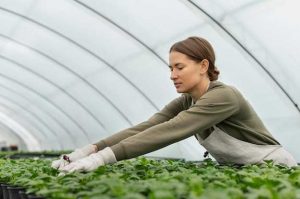

As the global population continues to grow at an unprecedented rate, the demand for food and agricultural products is skyrocketing. This surge in demand has created a wealth of opportunities for individuals looking to embark on a rewarding career or make a lucrative investment in the agricultural sector. With the advancement of technology and the adoption of sustainable practices, the agricultural industry has transformed into a dynamic and innovative field that offers a multitude of possibilities.
Whether you have a passion for sustainable farming, agri-tech, or agro-processing, the agricultural sector presents a vast array of career paths that cater to diverse interests and skill sets. From managing large-scale farms to developing cutting-edge agricultural technologies, the opportunities are endless. The sector not only offers the chance to make a positive impact on the environment but also provides the potential for substantial financial returns.
One of the key advantages of venturing into the agricultural industry is its resilience to economic downturns. While other sectors may experience fluctuations, the demand for food and agricultural products remains constant. This stability makes the agricultural sector an attractive option for individuals seeking long-term career prospects or investment opportunities. Moreover, with the increasing focus on sustainable and organic farming practices, there is a growing need for professionals who can contribute to the development of environmentally friendly solutions.
Investing in the agricultural sector can be a wise decision for those looking to diversify their portfolio and capitalize on the sector’s potential for growth. From investing in farmland to supporting agri-tech startups, there are various avenues to explore. The agricultural sector offers the opportunity to invest in tangible assets, such as land and machinery, as well as intangible assets, such as intellectual property and research and development. By investing in the agricultural sector, individuals can not only generate financial returns but also contribute to the development of sustainable and efficient food production systems.
The Growing Demand for Agribusiness Professionals
In today’s ever-evolving global landscape, the agricultural industry is experiencing a significant shift in demand for skilled professionals. As the world population continues to grow, so does the need for sustainable food production, innovative technologies, and efficient supply chains. This increasing demand presents a multitude of opportunities for individuals interested in pursuing a career in agribusiness.
Meeting the Challenges of a Changing World
The challenges faced by the agricultural sector are diverse and complex. Climate change, limited natural resources, and the need for sustainable practices are just a few of the pressing issues that agribusiness professionals must address. The ability to navigate these challenges and find innovative solutions is crucial for the industry’s growth and success.
Agribusiness professionals play a vital role in ensuring the efficient and sustainable production, processing, and distribution of agricultural products. They are responsible for managing the entire value chain, from farm to fork, and are involved in various aspects such as market analysis, financial management, supply chain logistics, and policy development.
Embracing Technology and Innovation
Agribusiness professionals must embrace technology and innovation to meet the growing demand for food and agricultural products. The integration of digital solutions, precision agriculture, and data analytics has revolutionized the industry, allowing for increased productivity, resource optimization, and improved decision-making.
Furthermore, the adoption of sustainable practices, such as organic farming, vertical farming, and renewable energy sources, is becoming increasingly important. Agribusiness professionals who possess the knowledge and skills to implement these practices are highly sought after by employers and investors.
In conclusion, the demand for agribusiness professionals is on the rise, driven by the need for sustainable food production, technological advancements, and the challenges posed by a changing world. As the agricultural sector continues to evolve, individuals with a passion for agriculture and a diverse skill set will find numerous opportunities to make a meaningful impact and contribute to the future of agribusiness.
Exploring Career Paths in the Field of Agricultural Business
When it comes to the diverse world of agricultural business, there are numerous exciting career paths to consider. This section aims to provide an overview of the various opportunities available within this thriving sector, highlighting the potential for growth and success.
1. Management and Leadership Roles:
- Operations Manager
- Supply Chain Manager
- Farm Manager
- Business Development Manager
- Marketing Manager
2. Financial and Analytical Roles:
- Financial Analyst
- Market Analyst
- Risk Manager
- Investment Advisor
- Commodity Trader
3. Research and Development:
- Agricultural Scientist
- Plant Breeder
- Food Technologist
- Sustainability Specialist
- Quality Control Analyst
4. Sales and Marketing:
- Agricultural Sales Representative
- Brand Manager
- Market Researcher
- Product Specialist
- Export Manager
5. Entrepreneurship:
- Start-up Founder
- Agricultural Consultant
- Agri-Tourism Operator
- Organic Farming Advocate
- AgTech Innovator
Each of these career paths offers unique opportunities for individuals passionate about the agricultural sector. Whether you are interested in managing operations, analyzing market trends, conducting research, driving sales, or even starting your own venture, the field of agricultural business provides a wide range of possibilities to explore and thrive in.
By gaining relevant skills, knowledge, and experience, you can position yourself for a successful and fulfilling career in agribusiness, contributing to the growth and sustainability of the agricultural sector.
The Role of Technology in Modern Agriculture
In today’s rapidly evolving agricultural landscape, technology plays a pivotal role in shaping the future of the industry. From precision farming to automated machinery, technological advancements have revolutionized the way farmers operate, increasing efficiency, productivity, and sustainability. This article explores the various ways in which technology is transforming modern agriculture and the opportunities it presents for both professionals and investors.
1. Precision Farming
Precision farming, also known as precision agriculture, is a farming approach that utilizes technology to optimize crop production and resource management. Through the use of sensors, drones, and GPS technology, farmers can collect real-time data on soil conditions, weather patterns, and crop health. This data enables them to make informed decisions regarding irrigation, fertilization, and pest control, resulting in higher yields and reduced environmental impact.
2. Automation and Robotics
The integration of automation and robotics in agriculture has significantly transformed traditional farming practices. Automated machinery, such as robotic harvesters and milking systems, streamline labor-intensive tasks, reducing the reliance on manual labor and increasing operational efficiency. Additionally, autonomous vehicles and drones are being used for crop monitoring, mapping, and spraying, enabling farmers to cover large areas quickly and accurately.
3. Data Analytics and Artificial Intelligence
Data analytics and artificial intelligence (AI) are revolutionizing decision-making processes in agriculture. By analyzing vast amounts of data collected from sensors, satellites, and other sources, AI algorithms can provide valuable insights and predictions regarding crop yields, disease outbreaks, and market trends. This information empowers farmers to optimize their production strategies, minimize risks, and make informed business decisions.
4. Vertical Farming and Indoor Agriculture
Vertical farming and indoor agriculture are innovative approaches that leverage technology to grow crops in controlled environments, such as vertical towers or climate-controlled warehouses. These methods utilize artificial lighting, hydroponics, and automated systems to create optimal growing conditions, regardless of external factors. Vertical farming and indoor agriculture offer year-round production, reduced water usage, and the ability to grow crops in urban areas, addressing the challenges of land scarcity and climate change.
- Improved crop monitoring and management
- Enhanced resource efficiency and sustainability
- Increased productivity and yields
- Minimized environmental impact
- Optimized decision-making and risk management
- Expanded opportunities for urban agriculture
In conclusion, technology has become an indispensable tool in modern agriculture, driving innovation, efficiency, and sustainability. The integration of precision farming, automation, data analytics, and vertical farming presents exciting opportunities for individuals seeking careers in the agricultural sector and investors looking to capitalize on the industry’s growth potential.
Investing in Agribusiness: Opportunities and Risks
Exploring the potential of investing in agribusiness can offer a multitude of opportunities for individuals and organizations seeking to diversify their portfolios. However, it is crucial to understand the inherent risks associated with this sector before making any investment decisions. This section aims to provide an overview of the opportunities and risks involved in agribusiness investments, allowing investors to make informed choices.
Opportunities in Agribusiness
Agribusiness presents a range of opportunities for investors looking to capitalize on the growing demand for agricultural products and services. With the global population steadily increasing, the need for food, fiber, and fuel continues to rise. This creates a favorable market for agribusiness investments, as the sector plays a vital role in meeting these demands.
Investing in agribusiness can provide opportunities for individuals to support sustainable farming practices, technological advancements, and innovative solutions that enhance productivity and efficiency in the agricultural sector. Additionally, agribusiness investments can contribute to rural development, job creation, and economic growth in both developed and developing regions.
Risks in Agribusiness
While agribusiness investments offer promising opportunities, it is essential to acknowledge the risks associated with this sector. Agricultural production is susceptible to various factors beyond an investor’s control, such as adverse weather conditions, pests, diseases, and market fluctuations. These risks can significantly impact crop yields, livestock production, and overall profitability.
Furthermore, agribusiness investments may face regulatory challenges, including changing government policies, trade restrictions, and environmental regulations. These factors can introduce uncertainties and affect the profitability and sustainability of agribusiness ventures.
Investors should also consider the social and ethical aspects of agribusiness, such as land rights, labor practices, and environmental sustainability. Failure to address these issues adequately can lead to reputational risks and potential legal liabilities.
- Market volatility and price fluctuations
- Climate change and natural disasters
- Regulatory and policy changes
- Social and ethical considerations
- Technological advancements and adoption
Understanding and managing these risks is crucial for investors to mitigate potential losses and maximize returns in the agribusiness sector. Conducting thorough research, diversifying investments, and seeking expert advice can help navigate the complexities and uncertainties associated with investing in agribusiness.
Sustainable Agriculture: A Promising Investment for the Future
Embracing sustainable agriculture practices presents a compelling opportunity for forward-thinking individuals and organizations seeking to invest in the future. This innovative approach to farming not only addresses the pressing environmental concerns but also offers significant economic and social benefits. By adopting sustainable agricultural practices, stakeholders can contribute to the preservation of natural resources, enhance food security, and create a resilient and profitable agricultural sector.
Preserving Natural Resources

Sustainable agriculture focuses on minimizing the negative impact on the environment by utilizing methods that conserve natural resources. Through the implementation of techniques such as organic farming, crop rotation, and integrated pest management, farmers can reduce soil erosion, conserve water, and protect biodiversity. By investing in sustainable agriculture, individuals and organizations can actively contribute to the preservation of our planet’s precious resources for future generations.
Enhancing Food Security and Profitability
Sustainable agriculture plays a crucial role in ensuring food security by promoting resilient farming systems. By diversifying crops, implementing agroforestry practices, and adopting climate-smart techniques, farmers can mitigate the risks associated with climate change and other environmental challenges. This not only ensures a stable food supply but also enhances the profitability of agricultural enterprises. Investing in sustainable agriculture presents an opportunity to support the production of high-quality, nutritious food while also generating economic returns.
| Benefits of Sustainable Agriculture: |
|---|
| 1. Environmental preservation |
| 2. Conservation of natural resources |
| 3. Enhanced food security |
| 4. Increased profitability |
| 5. Resilient farming systems |
In conclusion, sustainable agriculture presents a promising investment opportunity for those looking to make a positive impact on the future. By supporting environmentally friendly farming practices, individuals and organizations can contribute to the preservation of natural resources, enhance food security, and create a profitable and resilient agricultural sector. Investing in sustainable agriculture is not only a wise financial decision but also a responsible choice for the well-being of our planet and future generations.
Agribusiness Startups: Navigating the Challenges and Success Stories
Embarking on a journey in the realm of agribusiness startups entails navigating a myriad of obstacles and embracing the triumphs that come along the way. This section delves into the experiences of entrepreneurs who have ventured into the agricultural sector, highlighting the challenges they faced and the success stories that have emerged.
As aspiring agribusiness entrepreneurs, it is crucial to recognize the hurdles that may arise during the startup phase. These challenges can range from securing adequate funding and accessing suitable land to grappling with market fluctuations and regulatory complexities. However, it is through overcoming these obstacles that innovative solutions are born, paving the way for success.
One of the key success stories in the agribusiness startup landscape is the tale of a visionary entrepreneur who identified a gap in the market for organic produce. By leveraging sustainable farming practices and implementing cutting-edge technology, this startup not only met the growing demand for healthy and environmentally-friendly food but also established a strong brand presence in the market.
Another inspiring success story revolves around a group of agribusiness startups that joined forces to create a cooperative network. By pooling their resources and expertise, these startups were able to overcome individual limitations and collectively address challenges such as distribution logistics and market access. This collaborative approach not only enhanced their chances of success but also fostered a sense of community within the agricultural sector.
While each agribusiness startup journey is unique, there are common themes that emerge from these success stories. These include the importance of adaptability, resilience, and a deep understanding of the target market. By embracing innovation, staying abreast of industry trends, and forging strategic partnerships, agribusiness startups can navigate the challenges and position themselves for long-term success in the ever-evolving agricultural sector.





